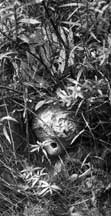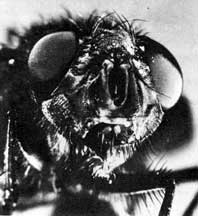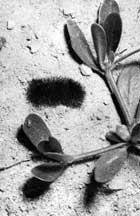Lucky Bugs and Others, Page 3
By DOROTHY PARKER ROWE
Honeybees, so mysterious in their actions and for so many centuries closely associated with man, have been linked with a host of superstitious ideas. These curious misconceptions cover a wide range and include such oddities as the following: A beekeeper must never count his hives or the insects will languish. No one can own more than ninety-nine hives; as soon as the number reaches 100, all of the bees will die. If bees alight on a baby, it is an omen that the child will be eloquent. A stolen swarm never thrives. Bees never prosper at the home of a quarrelsome family. Bees are idle or unfortunate in time of war. At midnight, on Christmas Eve, the bees hum in a particularly musical manner in special celebration of Christ's nativity.

IF WASPS BUILD THEIR NESTS LOW IT WOULD BE A MILD WINTER
In several parts of the world, it is believed that the bees must always be informed of important news events. Beekeepers, in certain parts of England, used to inform the inmates of the hives whenever a political change or a declaration of war occurred. Unless the insects were taken into their confidence in this way, the apiarists believed, they would not thrive. When the master (sometimes any member) of the household died, one of the family was delegated to knock on the side of each hive and repeat: "The master is dead! The master is dead! The master is dead!" If this ceremony were neglected, the bees would fly away. In pioneer America, the same idea prevailed. Whittier's poem "Telling The Bees" is based upon this age-old custom.
In other ways, bees have been treated as members of the family. At the time of a marriage feast, the Breton peasants, in France, always dressed their beehives in red. When a death occurred in the family, in certain regions of England, black crepe was placed on the hives, or a stick, painted black, was thrust into the ground beside each hive. For generations, it was the custom in one English village to give the bees a formal invitation to every funeral.

LET THE HOUSEFLY ALONE AND YOUR RESTRAINT WILL BRING GOOD LUCK
A few years ago, in a small town in northern Florida, I encountered on insect superstition that was new to me. A boy of about twelve assured me that a praying mantis could cause blindness by "spitting tobacco juice in your eye." He even declared that he had heard of a boy in a town twenty-five miles away who had lost his sight in just this way. Thousands of miles away from the Florida town, across the Atlantic, French children believe another equally unfounded idea about the praying mantis. They call the insect The Soothsayer. When a child is lost, the mantis if it is lifted from the ground will stretch out its forelegs and point the way home. Similarly, American farm boys, for generations, have interrogated daddy Ionglegs to find out the direction strayed cattle have taken.
Years ago, as a child on my grandfather's farm in the dune country of northern Indiana, I used to hear a curious superstition about houseflies. If you kill one fly, the saying went, ten more would come to its funeral. Another odd item on the list of fly-lore of that period was the belief that a fly buzzing about your face indicated that a stranger was anxious to meet you. Ever since the days of Aristotle, people have been imagining untrue things about the small masses of white foam seen clinging to grass and weeds in early summer. Throughout Europe, they have been thought to be "frog spit" or "cuckoo spit." In reality, they are produced by small, soft-bodied immature insects that live within the protection of the froth until they reach their adult, winged stage. The foam protects them from the sun and from their enemies. A superstition of the South, accepted by many Negroes, is that horseflies hatch from the masses.

THE WOOLY BEAR CATERPILLAR WAS BELIEVED TO INDICATE THE APPROACH OF WINTER
During winter months, insects of various kinds are thought to bring good luck to many people by entering dwellings for hibernation or for protection from the cold. A cricket in the house is considered a lucky portent in many parts of the world. To hear one of these insects chirping after a person has gone to bed, is believed to foreshadow extra good fortune.
Curiously enough, one of the most beneficial of our insects has been looked upon almost universally with superstitious dread. Superstition has if that dragonflies doctor snakes and even that they are evil spirits sent by Satan to plague the world. This is at wide variance with the truth. Dragonflies are, in reality, valuable friends of man. They catch and consume immense numbers of troublesome gnats and mosquitoes. Such facts are overlooked by superstition which, in the case of the dragonfly and the other insects, as in the case with everything else, is based on another foundation than the truth.
 Printer-friendly version
Printer-friendly version
